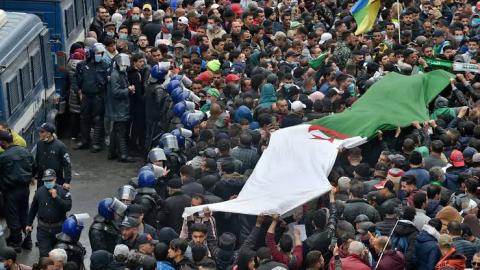
Alkarama shares the UN High Commissioner for Human Rights growing concern about the situation in Algeria, where "the rights to freedom of opinion and expression, peaceful assembly and participation in public affairs continue to be under attack. Therefore, the Algerian authorities must implement the presidential pardon granted to those participating in the peaceful movement. Algerian authorities must also stop all forms of harassment and intimidation against them, as well as stop using violence to disperse peaceful demonstrations and end the arbitrary arrests and detentions of individuals for exercising their rights to freedom of opinion, expression, and peaceful assembly.
Earlier, the UN Human Rights Office had expressed its deep concern about the deterioration of the human rights situation in Algeria and the continued and increased repression against members of the peaceful movement calling for democracy and freedom.
Alkarama has followed with great concern the deterioration of the human rights situation and the escalation of repression since the beginning of the movement in Algeria, and has shared the concern of families about the return of arrests and enforced disappearances.
Robert Colville, spokesman for the UN High Commissioner for Human Rights, said at a press conference in Geneva that since the resumption of demonstrations in the streets of Algeria on February 13, 2021, after a year of protests organized by the "Hirak" movement on the Internet due to the Covid-19 pandemic, the Office of the High Commissioner has reportedly received "constant reports of the use of unnecessary and disproportionate force against peaceful demonstrators, as well as arrests in progress."
Colville said student marches were prevented four times in April and May 2021. Authorities have continued to prevent people from reaching rally points for protests. He added, "Hundreds of protesters, or anyone the security forces perceive as a protester, are arbitrarily arrested." Some of the protesters were reportedly arrested and then released after being forced to sign a document pledging not to participate in the protests again.
Currently, approximately 70 people remain detained for exercising their legitimate human rights, while some are serving lengthy sentences and others are in pretrial detention. There have also been new allegations of physical and sexual abuse in detention in recent days.
Over the past two months, activists, human rights defenders, students, journalists, bloggers, and ordinary citizens who peacefully express dissent have continued to face criminal prosecution.
The trial of Hirak activists under sweeping laws continues even after the announcement of a presidential amnesty in February of this year.
Call for immediate investigations
The UN High Commissioner for Human Rights reiterated its call on the authorities to conduct immediate, impartial, and effective investigations into all allegations of human rights abuses, hold those responsible accountable, and ensure that victims receive reparations for their injuries. It also urged the authorities to review the penal code and other repressive laws, in particular Law 06-12 on associations and Law 91-19 on public meetings and demonstrations, in order to bring them into line with the International Covenant on Civil and Political Rights and the African Charter on Human and Peoples' Rights, which Algeria has ratified.
Alkarama's activities
The violation of the right to freedom of expression remains one of Alkarama's main concerns in Algeria, and individual complaints have been submitted regarding victims to the UN Special Procedures. An example of this is the arrest and detention of political activist Karim Tabou on 11 September 2019, for whom Alkarama has contacted the Human Rights Council mechanisms requesting his immediate release and that the General Staff take responsibility for his security. Similarly, the activist Ibrahim Douadji, activist of the movement in the city of Mostaganem, arbitrarily arrested by the police on 11 October 2019 .
Also in this context, Alkarama has raised with the UN High Commissioner for Human Rights and the UN Secretary General the continued use of violence and arbitrary arrests of peaceful demonstrators, as these actions not only violate international and Algerian law, but also carry individual criminal responsibility for their perpetrators and those working under their control.
In April 2019, Alkarama wrote to the UN mechanisms for the protection and promotion of human rights, asking them to intervene urgently to protect the right to peaceful assembly of Algerian citizens involved in the popular movement.
Alkarama has also called for the abolition of the articles of the Algerian penal code that criminalise freedom of expression and association in order to put an end to these practices. Following the amendments to the penal code with the adoption of Law No. 06-20 of 28 April 2020, Alkarama has asked several independent experts to carry out a joint study on the situation of fundamental rights and freedoms in Algeria, which has continued to deteriorate since the beginning of the popular movement in February 2019.
Violations of the rights to freedom of expression, peaceful assembly, and association have become a systematic policy, as many political opponents, journalists, and other peaceful activists have been tried and sentenced to prison terms or unjust punishments for actions labeled as "undermining the morale of the army" or "the unity of the national territory" by the judicial authorities, without these concepts being specified at all.
During the last review of Algeria by the Human Rights Committee in 2018, the Committee had already expressed its concerns about the violation by the Algerian authorities of fundamental freedoms, in particular freedom of opinion and expression. In this regard, the UN experts expressed concern that articles 144 and 144 bis of the Penal Code "continue to criminalize or impose fines on activities related to the exercise of freedom of opinion and expression, such as defamation or contempt for public officials or state institutions."
